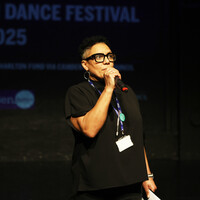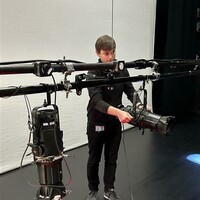Sat 28 May: Iolanda Portogallo/When Time Was New (Brooke Milliner)

News Story
Iolanda Portogallo IO
When Time Was New (Brooke Milliner) PSYCHE
The bad news was that three became two with the last minute withdrawal of Solomon Berrio-Allen who was due to perform his own choreographed solo as the programme’s opener. I wish him a quick recovery from injury and hope this is a postponement and not a cancellation. The good news was that the remaining works were refreshingly diverse, presenting dance for simple joy and challenging polemic.
Iolanda Portogallo – recently remembered for her work with Jamaal Burkmar - came from Leeds to deliver a charming exercise in the easy pleasure of dance. Her performers (Dorna Ashroy, Naomi Chockler and Sophie Thomas) presented an engaging trio; dressed in white with red bucket hats, they offered the impression of puppetry (I’m old enough for Bill and Ben to have come to mind) and a cartoonish quality to three distinct sections, each underpinned by its own layered repetitive musical theme. IO concerned nothing in particular other than the gentle and expressive rapport amongst the trio, occasionally punctuated by the fluidity of fast spins by these excellent dancers. It was an impressive first attempt at professional choreography.
With his new company, When Time Was New, Brooke Milliner is clearly playing his part in returning hip-hop to its roots as an artistic tool to reflect societal problems but expanded to the medium of dance theatre. Psyche combined spoken word and choreography to contrast the tough choices required to combat the cost of ego. Unfortunately, Samuel Ade’s speech was regularly impacted by feedback from his lapel microphone and this left me wondering whether the work would have stood well enough on its own as pure dance theatre. Milliner has assembled a strong group of six dancers, including 2019 BBC Young Dancer winner Max Revell and the extraordinary skills of Filipino dancer, Jonadette Carpio (Syllabub in the Cats Movie) who impressed with two powerful Krumping solos. Milliner and When Time Was New could be pursuing a similar upward trajectory to Botis Seva’s Far From The Norm.
Graham Watts
As the light comes on we see a pile of bodies all dressed in white cotton and the bobbing bright red fisherman hats tell us that there are three dancers. Iolanda Portogallo immediately transports the audience to an undefinable landscape by setting accurate and sweeping corporeal figures against dreamlike music. As the dancers detach and form alliances repeatedly by gliding and dashing across the floor, the cluster oscillates, but takes the stage in sparkly exuberance. There is something truly dazzling about this level of smooth quirkiness within the composition. The piece is sewn together from distinctive parts, yet the pleasing flow of the whole performance is perhaps the main attraction. It culminates in the last phrases where the cheerful and recognisable popular dance moves bring the dancers to a satisfying synchrony.
Brooke Milliner brings together some incredible dancers in his piece Psyche. The audience enters a sombre world when the first character of the piece appears among other suit-wearing and suitcase-carrying dancers. It was then sharply contrasted with the uncomfortable scene in which the second character is thrown around by other dancers in a jail made evident by the lights and costume. The two characters who play the optimist and pessimist, with peace and chaos as their prominent attributes respectively, stand at polarised ends. What is worth mentioning are the supporting dancers who move in sharp and exciting synchronicity. Just as this project wants to ask if we can break out of our cycle of repetition, I wonder if the male psyche is more than the binary positions depicted in the office-going and prison-going scenarios. Has life got more nuanced choices on offer than the blue and red contrasting oppositions?
Hazel Lam


